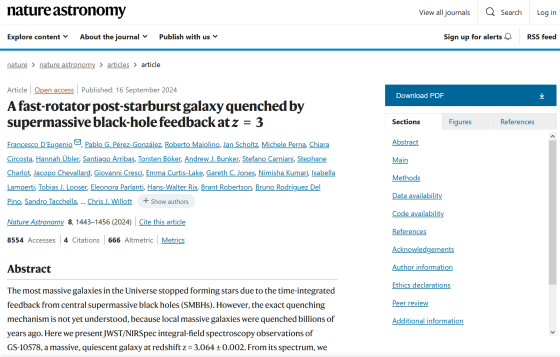Black holes are 'starving' galaxies

A study of black holes, which are believed to have such strong gravity that even light cannot escape, has revealed that they may be preventing new stars from forming.
A fast-rotator post-starburst galaxy quenched by supermassive black-hole feedback at z = 3 | Nature Astronomy

Astronomers detect black hole 'starving' its host galaxy to death
Black hole spotted by James Webb Space Telescope “starving” its host galaxy to death
https://cosmosmagazine.com/space/astronomy/black-hole-starving-galaxy-webb/
The galaxy that Cambridge University astronomer Francesco DeUgenio and his colleagues investigated was a galaxy called 'GS-10578.' This galaxy is roughly the same size as the Milky Way, but has about 200 billion times the mass. It is about 12 billion light years away from the Milky Way, and the image that can be observed from Earth today is said to be from about 2 billion years after the Big Bang, in the early stages of the birth of the universe.
DeEugenio and his colleagues found that the galaxy is essentially 'dead,' meaning that new stars have largely stopped forming, but they were unable to determine whether this was a temporary pause in star formation or whether it was permanently eliminated.

So DeUgenio and his colleagues used NASA's
As a result, it was found that GS-10578 was ejecting a large amount of gas at a speed of about 1000 km per second. This 'wind' caused by the black hole was so fast that it was fast enough to escape the galaxy's gravity. The mass of gas ejected from the galaxy was greater than the mass required for the galaxy to continue forming new stars, which means that the black hole was 'blowing away the food needed to form stars.'

This gas is cold, dense, and does not emit light, so it was previously impossible to see with telescopes, but the superb sensitivity of the James Webb Space Telescope led to its discovery. Until then, the activity of a black hole had only been theoretically known, but it was now possible to observe it with a telescope.
'We knew that black holes have a big effect on galaxies, and that they probably stop star formation quite often,' DeEugenio said. 'But until the James Webb Space Telescope's discovery, we hadn't been able to study this galaxy in detail, and we didn't know whether the pause in star formation was temporary or permanent.'
'In the early universe, many galaxies were forming many stars, so it's interesting to see such a large dead galaxy,' said co-author Professor Roberto Maiorino of the Kavli Institute for Cosmology. 'GS-10578 is so massive, but assuming it had enough time to grow to this size, it's likely that the process that stopped star formation happened relatively early on.'
Related Posts:
in Science, Posted by log1p_kr







